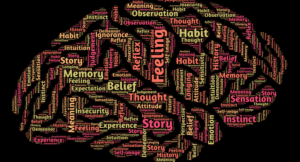
In this course, we embark on an exciting journey into the world of cognitive psychology. This fascinating field explores the intricacies of the human mind and how we process information. Cognitive psychology delves into various mental processes, including perception, memory, thinking, problem-solving, and language. By understanding these processes, we gain insight into how we learn, make decisions, and interact with the world around us. Whether you’re new to the subject or looking to deepen your knowledge, we hope you find this exploration both enlightening and inspiring. Welcome to the study of the mind!
COURSE OVERVIEW
Course Description, Goals, & Objectives: This course provides an introduction to cognitive psychology, focusing on how people acquire, store, communicate and use information. Cognitive psychologists ask questions that many of us ask ourselves in our everyday lives–the Whats? Whys? and Hows?–to determine answers to how we educate, evaluate, and persuade people, and much more. This course focuses on historical and recent theoretical studies and findings related to the neural mechanisms underlying cognitive processes. Prerequisite(s): PSYC 100.
At the end of this course students will be able to:
| Demonstrate knowledge of theories, theorists, research studies, concepts, and themes in cognitive psychology |
| Demonstrate understanding of the historical basis in which cognitive psychology was formed as a branch of general psychology |
| Distinguish the major theoretical objectives of cognitive psychology from other sub-disciplines in the field of psychology |
| Differentiate the goals of the subareas within the study of cognitive psychology |
| Evaluate scientific research methods such as descriptive and experimental research and quantitative analysis. |
| Apply critical thinking to evaluating research, popular articles, and cognitive topics in various media. |
| Describe how ethical standards apply to psychological science and everyday practices. |
| Synthesize ideas, interpret quantitative and qualitative data, and present evidence-based arguments in various formats including writing and oral communication. |
| Apply cognitive theories and knowledge to problem solving and strategies in real-life situations. |
| Describe how what you have learned in studying cognitive psychology can be used in your professional career. |
Course Topics include: Cognition as the Study of Information Processing,Perception and Consciousness, Mechanisms of Attention, Immediate Memory, Concepts and Categories of Object Recognition, Basic Processes in Long-Term Memory,The Reconstructive Nature of Memory, Autobiographical Memory, Basic Issues in Language and Speech Processing, Reading and Comprehending Text, Judgments and Decisions, and Problem Solving
Professor Sonja Ann Miller, PhD
Candela Citations
- Course Description. Authored by: Sonja Miller. Provided by: Hudson Valley Community College. License: CC BY-NC-ND: Attribution-NonCommercial-NoDerivatives
